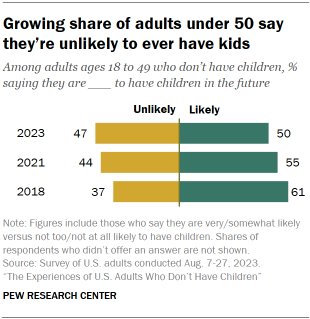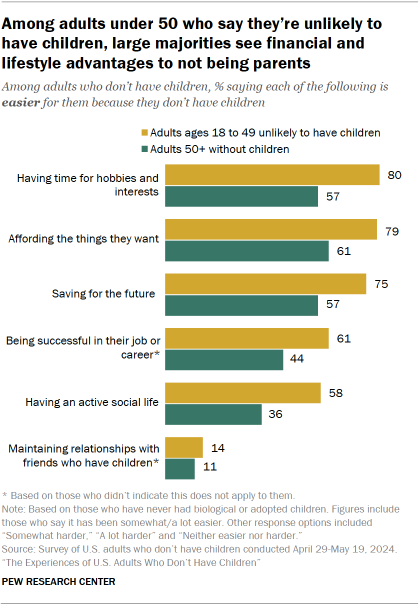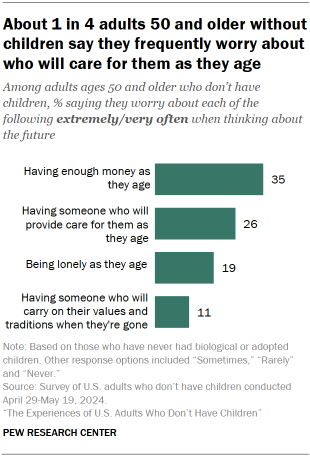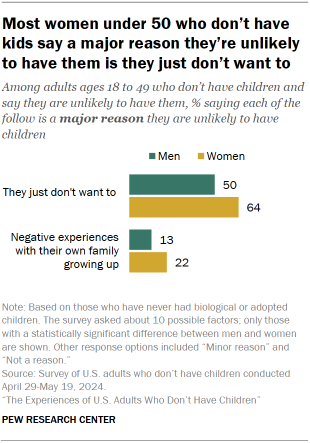POPULATION OPTIMUM
Numbers, Facts and Trends Shaping Your World
Read our research on:
- Research Topics
- Publications
- Our Methods
- Short Reads
- Tools & Resources
- Experts
- About Us
Home Research Topics Family & Relationships Parenthood
- Report
|
July 25, 2024
The Experiences of U.S. Adults Who Don’t Have Children
57% of adults under 50 who say they’re unlikely to ever have kids say a major reason is they just don’t want to; 31% of those ages 50 and older without kids cite this as a reason they never had them
ByRachel Minkin,Juliana Menasce HorowitzandCarolina Aragão
How we did this
Terminology

The U.S. fertility rate reached a historic low in 2023, with a growing share of women ages 25 to 44 having never given birth.
And the share of U.S. adults younger than 50 without children who say they are unlikely to ever have kids rose 10 percentage points between 2018 and 2023 (from 37% to 47%), according to a Pew Research Center survey.
In this report, we explore the experiences of two groups of U.S. adults:
- Those ages 50 and older who don’t have children
- Those younger than 50 who don’t have children and say they are unlikely to in the future
About four-in-ten of those in the older group (38%) say there was a time when they wanted to have children. A smaller but sizable share (32%) say they never wanted children, and 25% say they weren’t sure one way or the other. Few say they frequently felt pressure to have children from family, friends or society in general.
Reasons for not having children – or being unlikely to ever have them – differ between the older and younger groups. The top response for those ages 50 and older is that it just didn’t happen. Meanwhile, those in the younger group are most likely to say they just don’t want to have kids. Women younger than 50 are especially likely to say they just don’t want to have children (64% vs. 50% of men in this group).
Majorities in both groups say not having kids has made it easier for them to afford the things they want, have time for hobbies and interests, and save for the future. In the younger group, about six-in-ten also say not having kids has made it easier for them to be successful in their job or career and to have an active social life.
Still, majorities in both groups say parents have it easier when it comes to having someone to care for them as they age. Large shares in both groups say having a fulfilling life doesn’t have much to do with whether someone does or doesn’t have children.
These are among the key findings from a new Pew Research Center survey of 2,542 adults ages 50 and older who don’t have children and 770 adults ages 18 to 49 who don’t have children and say they are not too or not at all likely to have them. The survey was conducted April 29 to May 19, 2024.
Jump to read more about:
- Reasons adults give for not having children
- Perceived pros and cons of not having children
- Relationships and caregiving among adults without children
- Demographic and economic characteristics of adults 50 and older without children
Reasons for not having children
The study explores reasons U.S. adults give for not having children, among those ages 50 and older who haven’t had kids and those under 50 who say they’re unlikely to ever become parents.

By margins of at least 10 points, those in the younger group are more likely than those ages 50 and older to say each of the following is a major reason:
- They just don’t want to have children (57% in the younger group vs. 31% in the older group)
- They want to focus on other things, such as their career or interests (44% vs. 21%)
- Concerns about the state of the world, other than the environment (38% vs. 13%)
- They can’t afford to raise a child (36% vs. 12%)
- Concerns about the environment, including climate change (26% vs. 6%)
- They don’t really like children (20% vs. 8%)
In turn, a larger share of those in the older group say a major reason they didn’t have kids is that they didn’t find the right partner (33% vs. 24% of those in the younger group).
There are no significant differences between the two groups in the shares pointing to infertility or other medical reasons (their own or their spouse’s or partner’s) or to a spouse or partner who didn’t want to have children as major reasons.
Among those in their 40s, 22% say infertility or other medical reasons are a major factor in why they’re unlikely to ever have children. About one-in-ten of those ages 18 to 39 (9%) say the same.
The impact of not having children
Majorities of adults ages 50 and older who don’t have kids and those under 50 who say they’re unlikely to do so see some benefits to not having children.

But by margins ranging from 17 to 23 points, those in the younger group are more likely than those ages 50 and older to say each of the following has been easier for them because they don’t have children:
- Having time for hobbies and interests (80% in the younger group vs. 57% in the older group)
- Affording the things they want (79% vs. 61%)
- Saving for the future (75% vs. 57%)
- Being successful in their job or career (61% vs. 44%, among those who don’t indicate this doesn’t apply to them)
- Having an active social life (58 vs. 36%)
The impact at work
We also asked those who are employed about the impact not having children has had on their work lives.
Experiences are mixed. For example, 45% of those in the younger group and 35% of those in the older group say they’ve had more opportunities to network outside of work hours because they don’t have kids. At the same time, about a third in each group say they’ve been expected to take on extra work or responsibilities, and many also say they’ve been given less flexibility than those who have children.
Worries about the future

The survey also asked adults ages 50 and older without children about certain concerns they may have as they age.
About one-in-five or more say they worry extremely or very often about:
- Having enough money (35%)
- Having someone who will provide care for them (26%)
- Being lonely (19%)
A smaller share (11%) say they frequently worry about having someone who will carry on their values and traditions when they’re gone.
In a separate survey, 46% of parents ages 50 and older said they frequently worry about having enough money as they age. Smaller shares said the same about having someone who will provide care for them as they age (20%), having someone who will carry on their values and traditions (17%) and being lonely as they age (15%).
How the survey findings do – or don’t – differ by gender
For the most part, the experiences of adults without children and the reasons they give for not having them don’t vary much by gender. This is the case across both age groups.
Still, there are some questions on which men and women without kids differ considerably.
Among those ages 50 and older, women are more likely than men to say:
- Being successful in their job or career has been easier because they don’t have children (50% among women vs. 39% among men).
- They felt pressure to have children from society in general at least sometimes when they were younger (42% vs. 27%).

Among those ages 18 to 49, women are more likely than men to say each of the following is a major reason they’re unlikely to have children:
- They just don’t want to (64% vs. 50%)
- Negative experiences with their own families growing up (22% vs. 13%)
Women in the younger group are also more likely than their male counterparts to say the topic of whether they’ll have children comes up in conversation with their friends at least sometimes (41% vs. 26%).
Demographic and economic differences between adults 50 and older with and without children
In addition to the survey findings, this report includes an analysis of government data to show how the demographic characteristics and economic outcomes of adults ages 50 and older who don’t have children differ from those ages 50 and older who are parents.
Among adults in this age group, those who don’t have children are less likely to have ever been married. They are more likely to have a bachelor’s degree or more education. This difference in educational attainment is especially pronounced among women.
Older women who don’t have children have higher median monthly wages than mothers. The opposite is true among older men; those without children tend to earn less than fathers.
Next: Reasons adults give for not having children
← Prev Page
Sign up for our weekly newsletter
Fresh data delivery Saturday mornings
Topics
Related
Cultural Issues and the 2024 Election
Americans overwhelmingly say access to IVF is a good thing
Few East Asian adults believe women have an obligation to society to have children
Among parents with young adult children, some dads feel less connected to their kids than moms do
How Teens and Parents Approach Screen Time
Most Popular
1Joe Biden, Public Opinion and His Withdrawal From the 2024 Race
2How the origins of America’s immigrants have changed since 1850
3How Americans Get Local Political News
4U.S. adults under 30 have different foreign policy priorities than older adults
5Third-party and independent candidates for president often fall short of early polling numbers
Report Materials
Table of Contents
- The Experiences of U.S. Adults Who Don’t Have Children
- 1. Reasons adults give for not having children
- 2. Perceived pros and cons of not having children
- 3. Relationships and caregiving among adults without children
- 4. Demographic and economic characteristics of adults 50 and older without children
- Acknowledgments
- Methodology
901 E St. NW, Suite 300
Washington, DC 20004
USA
(+1) 202-419-4300 | Main
(+1) 202-857-8562 | Fax
(+1) 202-419-4372 | Media Inquiries
Research Topics
Follow Us
ABOUT PEW RESEARCH CENTER Pew Research Center is a nonpartisan fact tank that informs the public about the issues, attitudes and trends shaping the world. It conducts public opinion polling, demographic research, media content analysis and other empirical social science research. Pew Research Center does not take policy positions. It is a subsidiary of The Pew Charitable Trusts.
© 2024 Pew Research Center
- About
- Terms & Conditions
- Privacy Policy
- Cookie Settings
- Feedback
- Careers
Based on your impressions of our research, how trustworthy is the information on this page?Not trustworthy at allNot very trustworthySomewhat trustworthyVery trustworthyExtremely trustworthy
What is your highest level of education?Less than High SchoolHigh School/GEDAssociates degreeBachelors degreeMasters degreeDoctorate degree
Is there anything else you’d like us to know?Submit
Thank you for your feedback!
